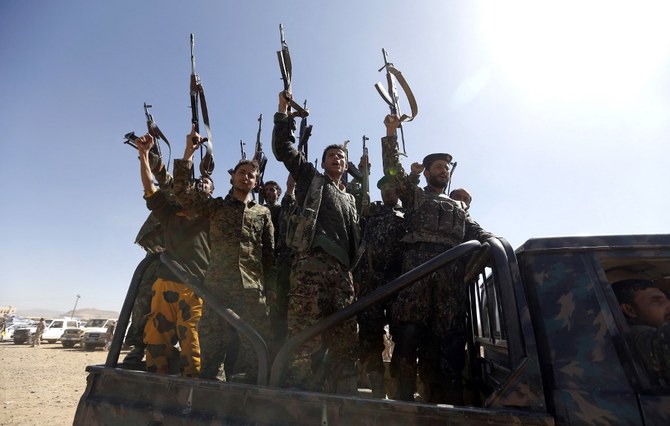AL-MUKALLA: Saudi and Omani mediators arrived in Houthi-held Sanaa over the weekend to discuss a “near-final” draft of a peace agreement with Houthi leaders to end the war in Yemen, Yemeni officials and local media said.
Houthi official media reported on Sunday that Saudi and Omani delegations landed at Sanaa airport to meet the head of the Houthi Supreme Political Council, Mahdi Al-Mashat, to discuss lifting “the siege” and ending “the aggression,” as well as paying public employees in areas under the militia’s control with oil and gas revenues from government-controlled fields.
A Yemeni government official told Arab News that the delegations would deliver a draft text of a peace agreement approved by the internationally recognized government to the Houthis.
The proposals, drafted by Saudi officials, suggest extending the UN-brokered truce for six months, direct discussions between the Houthis and the Yemeni government under the auspices of the UN and a two-year transitional period.
The document also proposes removing limitations on Houthi-controlled airports and seaports, compensating public workers in Houthi-controlled regions, and opening roads in Taiz and other provinces.
Last week, Yemen’s Presidential Leadership Council supported the Saudi peace ideas but emphasized that any discussions with the Houthis should result in a comprehensive and lasting peace accord, rather than short-term truces, and called for assurances that the Houthis would not violate agreements.
The arrival of the two delegations coincided with the Houthi announcement that Saudi Arabia had released 13 of the militia’s inmates in return for a Saudi prisoner freed earlier.
Similarly, Yemeni Foreign Minister Ahmed Awadh bin Mubarak said that the Saudi-Iran peace agreement had hastened Yemeni peace efforts and prompted the Houthis to “seriously” address delicate issues.
The Yemeni minister said that the Houthis, who had previously refused appeals and suggestions to free captives, altered their conduct after the reconciliation between Iran and Saudi Arabia, deciding to exchange prisoners with their opponents.
“This time, for the first time, we witnessed a serious approach to addressing this issue, which we view as a positive development,” bin Mubarak said in an interview with Egypt’s Al-Qahera News, referring to the latest successful prisoner swap talks.
The Yemeni minister said that the Houthis also turned to peace after failing to seize control of the oil and gas city of Marib and other Yemeni cities. He also urged Iran to cease its military support for the Houthis and promote peace in Yemen.
“Yemen is the finest place to demonstrate that Iran is abandoning its regional expansionist goals.”
















